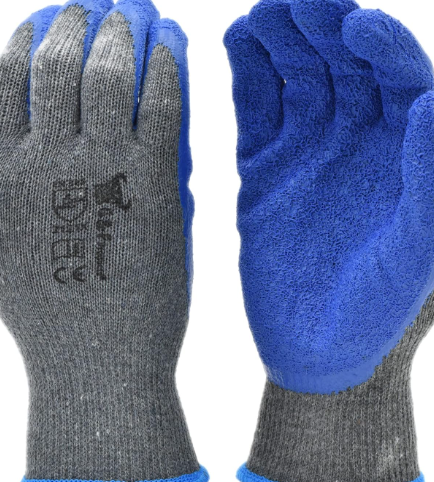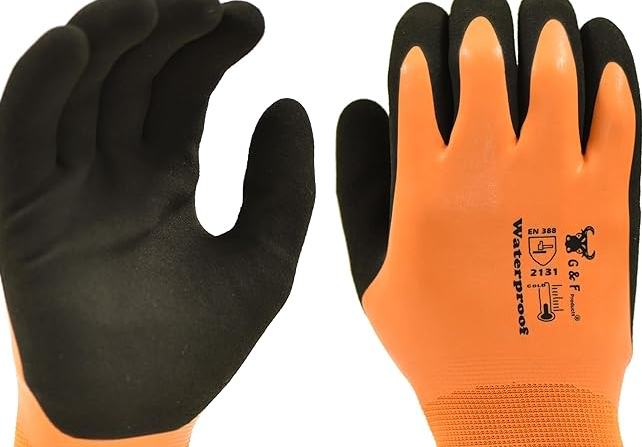Grip work gloves are essential tools for various industries where workers rely on a firm and secure grip to handle materials, tools, and equipment.
Table of Contents
These gloves are designed to improve hand dexterity while reducing the risk of accidents caused by slipping objects or tools. Whether you’re working in construction, automotive repair, or warehouse logistics, grip work gloves provide the perfect combination of protection, comfort, and functionality.
With advancements in materials and design, grip work gloves are now more versatile and specialized, catering to different tasks and environments.
Some gloves offer waterproofing for wet conditions, while others are built to withstand chemicals and hazardous substances. This guide will cover the benefits, types, and features of grip work gloves, helping you understand how to choose the right pair for your specific needs.

Benefits of Grip Work Gloves
Grip work gloves offer multiple benefits, making them an indispensable piece of safety equipment across various industries. Their design ensures that workers maintain control and precision while performing tasks that require a firm grip.
Enhanced Grip for Precision Tasks
One of the main benefits of grip work gloves is their ability to enhance hand control and grip strength. These gloves typically feature a textured or coated surface on the palms and fingers, which increases friction when handling objects. This is particularly useful in industries such as construction, mechanics, and manufacturing, where precise handling of tools, equipment, and materials is essential.
By providing better control, grip gloves allow workers to perform intricate tasks with greater ease and confidence. This is especially helpful when dealing with small parts or slippery objects, as the gloves prevent items from slipping through the fingers. The enhanced grip also helps reduce the amount of pressure needed to hold onto tools, minimizing hand fatigue.
Protection from Slips and Accidents
Grip work gloves are designed to reduce the risk of accidents caused by slipping tools or materials. In industries like construction or manufacturing, workers often handle heavy or sharp objects that could cause injury if not securely gripped. The enhanced grip provided by these gloves helps prevent accidents, ensuring the safety of the worker and those around them.
Additionally, grip work gloves often feature protective coatings that make them resistant to punctures, cuts, and abrasions. This added layer of protection helps shield hands from workplace hazards while improving grip performance.
Comfort and Reduced Fatigue
Another significant advantage of grip work gloves is the comfort they offer. Many grip gloves are designed with ergonomics in mind, providing a snug fit that conforms to the natural shape of the hand. This reduces strain on the hands and wrists, making it easier to perform tasks over extended periods.
In addition to improving comfort, these gloves also help reduce hand fatigue. By enhancing grip strength and requiring less effort to hold objects securely, workers can complete their tasks more efficiently without experiencing excessive strain or discomfort.
Types of Grip Work Gloves
Grip work gloves come in various materials and designs, each suited to specific tasks and environments. Understanding the different types of grip work gloves available will help you choose the right pair for your needs.
Rubber-Coated Gloves
Rubber-coated gloves are among the most popular types of grip work gloves due to their excellent grip and durability. The rubber coating, usually applied to the palms and fingers, creates a non-slip surface that enhances the ability to handle slippery or wet objects. This type of glove is ideal for tasks involving heavy lifting, construction, and warehouse work.
Rubber-coated gloves are also known for their resistance to punctures and abrasions, making them highly durable. They provide a protective barrier against rough surfaces and sharp objects while ensuring a strong grip in both wet and dry conditions. These gloves are especially useful in environments where workers frequently handle materials like glass, metal, or concrete.
Nitrile-Coated Gloves
Nitrile-coated gloves are another popular option for workers who need a high level of grip and protection. Nitrile is a synthetic rubber that is resistant to oils, chemicals, and punctures, making these gloves ideal for industries such as automotive repair, chemical handling, and food processing.
The nitrile coating offers excellent grip in both dry and wet environments, making it easier to handle oily or greasy objects. Unlike latex, nitrile is also hypoallergenic, making these gloves a safe option for individuals with latex allergies. Nitrile-coated gloves offer the perfect balance of grip, flexibility, and chemical resistance, making them a versatile choice for various tasks.
Textured Latex Gloves
Textured latex gloves are designed to provide an excellent grip for tasks that require precision and control. The textured surface on the fingers and palms creates additional friction, allowing workers to handle delicate or slippery objects with ease. These gloves are commonly used in medical, laboratory, and food service environments, where handling small objects is essential.
While latex gloves offer a high level of dexterity and grip, they may not be suitable for individuals with latex allergies. However, for those who can wear them, these gloves provide an excellent balance of comfort, flexibility, and grip strength.
How to Choose the Right Grip Work Gloves
Choosing the right pair of grip work gloves is crucial for ensuring safety, comfort, and efficiency on the job. Several factors should be considered when selecting the best gloves for your needs.
Material
The material of the gloves plays a significant role in determining their durability, grip performance, and protection. Rubber and nitrile-coated gloves are ideal for tasks that involve handling rough or slippery objects, as they offer excellent grip and resistance to abrasions. For tasks that require precision, such as medical work or food handling, textured latex gloves are a suitable choice.
It’s important to select gloves made from materials that are compatible with the specific hazards of your work environment. For example, nitrile gloves are resistant to chemicals, making them ideal for industries where workers are exposed to hazardous substances.
Durability
Durability is another important factor when choosing grip work gloves. High-quality gloves should be able to withstand wear and tear while maintaining their grip performance over time. Look for gloves with reinforced palms and fingers, as these areas are most prone to damage. In addition, consider gloves with puncture-resistant coatings if your work involves handling sharp objects.
Flexibility and Comfort
While grip and protection are essential, flexibility and comfort should not be overlooked. Gloves that are too rigid can limit hand movement and cause discomfort, while gloves that are too loose may reduce grip strength. Look for gloves that offer a snug fit and are designed to move with the natural contours of your hands.
Additionally, consider features like moisture-wicking liners or breathable materials, especially if you’ll be wearing the gloves for extended periods.
Industries and Tasks Where Grip Work Gloves are Essential
Grip work gloves are used in various industries where maintaining a secure grip and protecting the hands are crucial. These gloves provide the necessary safety and comfort for handling a wide range of tasks.
Construction and Heavy-Duty Work
In construction, grip work gloves are indispensable for handling tools, heavy materials, and machinery. Workers in this industry often face hazards like sharp objects, rough surfaces, and dangerous equipment. Grip gloves provide the enhanced control needed to prevent accidents and injuries, while also offering protection from abrasions and cuts.
Mechanics and Auto Repair
Mechanics and auto repair professionals rely heavily on grip work gloves for handling oily or greasy parts. Nitrile-coated gloves are especially useful in this industry, as they offer resistance to oil and chemicals while maintaining a strong grip. These gloves also protect hands from sharp edges and heat when working with engines and machinery.
Warehouse and Logistics
Warehouse workers handle a wide variety of materials, from small packages to large crates. Grip work gloves help improve handling efficiency while reducing the risk of injuries caused by slipping or dropping items. Rubber-coated gloves are particularly popular in warehouse settings, where they provide the durability and grip needed to manage heavy lifting and fast-paced tasks.
Top Brands for Grip Work Gloves
Several reputable brands are known for producing high-quality grip work gloves. Each brand offers a variety of gloves designed to meet the needs of different industries and tasks.
Mechanix Wear

Mechanix Wear is a well-known brand that specializes in durable, high-performance work gloves. Their grip work gloves are designed for use in industries such as construction, mechanics, and military applications. Mechanix gloves offer excellent grip, protection, and comfort, making them a top choice for professionals in demanding environments.
Ironclad

Ironclad is another trusted brand that produces a wide range of grip work gloves for industrial use. Their gloves are designed to provide maximum protection while enhancing grip and dexterity. Ironclad gloves are built to withstand tough conditions, making them ideal for construction, automotive work, and heavy-duty tasks.
Ansell

Ansell is a leading manufacturer of personal protective equipment, including grip work gloves. Their gloves are designed for use in industries such as healthcare, food processing, and manufacturing. Ansell’s grip gloves are known for their comfort, flexibility, and superior grip, making them a popular choice for workers in various industries.
Maintaining Grip Work Gloves
Proper care and maintenance of grip work gloves ensure they remain effective and durable over time. By following these simple steps, you can extend the lifespan of your gloves and keep them in good condition.
Cleaning and Care
The cleaning process for grip work gloves varies depending on the material. Fabric or synthetic gloves can usually be machine-washed, while leather or coated gloves should be wiped down with a damp cloth. After cleaning, allow the gloves to air dry completely before using them again.
Avoid exposing the gloves to extreme temperatures or harsh chemicals during cleaning, as this can degrade the materials and reduce their effectiveness.
Extending the Lifespan
To extend the lifespan of your grip work gloves, store them in a cool, dry place when not in use. Regularly inspect the gloves for signs of wear and tear, such as thinning material or holes. If the gloves show significant signs of damage, it’s important to replace them to ensure continued protection and performance.
Q&A Section
Q: What are the best materials for grip work gloves?
A: The best materials for grip work gloves depend on the task. Rubber and nitrile coatings provide excellent grip in wet or oily conditions, while latex offers high dexterity for precision tasks.
Q: Can grip work gloves be used in cold weather?
A: Yes, many grip work gloves come with insulation for cold weather use. These gloves provide the same grip performance while keeping hands warm and protected from the cold.
Q: How often should grip work gloves be replaced?
A: The frequency of replacement depends on the wear and tear of the gloves. Inspect them regularly for signs of damage, such as thinning material or holes. Gloves should be replaced when they no longer provide adequate protection or grip.
Conclusion
Grip work gloves are essential for ensuring safety, control, and efficiency in various industries. From construction to auto repair, these gloves provide enhanced grip, protection from hazards, and comfort for long-term use. By selecting the right type of gloves based on material, durability, and flexibility, workers can stay safe and productive while performing a wide range of tasks. With proper care and maintenance, grip work gloves will remain a reliable tool for years to come.


